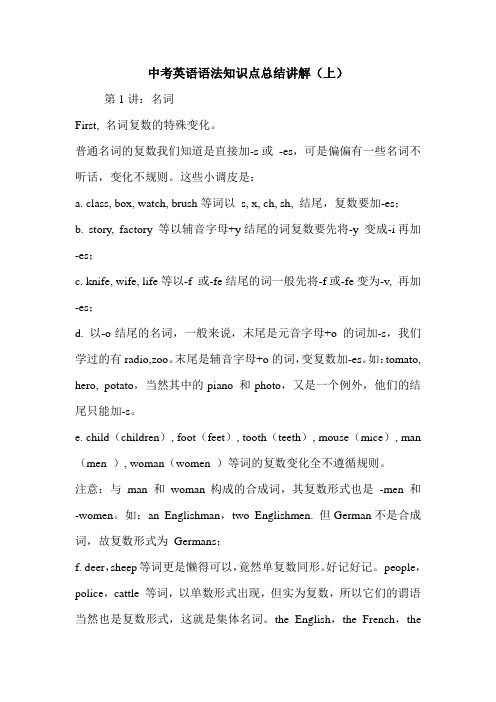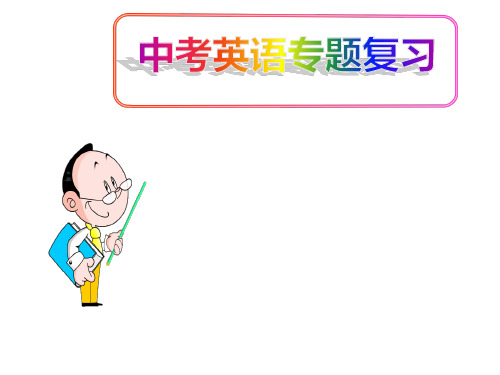中考英语语法讲解资料及练 第5讲:动词
牛津深圳版九年级下册 Unit 5 Sport 语法梳理和练习

广州牛津版九年级下册Unit 5 语法梳理与练习时态复习动词时态是谓语动词所表示的动作或状态发生时间和方式的各种形式。
初中阶段必须掌握的六种时态有:一般现在时、现在进行时、现在完成时、一般将来时、一般过去时和过去进行时。
具体用法总结如下:1. 在时间状语从句和条件状语从句中,用一般现在时表示将来。
例如:If it doesn’t rain tomorrow, we’ll go swimming. 如果明天不下雨,我们就去游泳。
After I graduate, I’ll go to a good university.毕业后我要去一所好大学。
2. 句子开头有Listen,Look,Be quiet等标志词时,该句子的时态要用现在进行时。
例如:Look! How happily the children are playing!看!孩子们玩得多么高兴!3. 谓语动词是come,go,arrive,leave,return等动词时,可以用现在进行时来表示将来。
例如:We are leaving for Beijing next week.下周我们将要去北京。
被动语态复习语态是动词的一种形式,用来说明主语与谓语动词之间的关系。
如果主语是动作的执行者,就用主动语态;如果主语是动作的承受者,就用被动语态。
英语中被动语态的谓语由“be+动词的过去分词”构成,be有时态、人称和数的变化。
初中阶段常见的几种被动语态总结如下:注意:1. 含情态动词的被动语态的构成是“情态动词+ be +动词的过去分词”。
2. 在被动语态中,如果要表示某个动作的执行者,可以在谓语动词后面加 by短语。
但如果无须说明动作的执行者或者只强调动作的承受者时,则可以省略by短语。
例如:This book is written by Mark Twain. 这本书是马克·吐温写的。
Rice is grown in this place. 这个地方种植水稻。
中考英语语法知识点总结讲解(上)

中考英语语法知识点总结讲解(上)第1讲:名词First, 名词复数的特殊变化。
普通名词的复数我们知道是直接加-s或-es,可是偏偏有一些名词不听话,变化不规则。
这些小调皮是:a. class, box, watch, brush等词以s, x, ch, sh, 结尾,复数要加-es;b. story, factory 等以辅音字母+y结尾的词复数要先将-y 变成-i再加-es;c. knife, wife, life等以-f 或-fe结尾的词一般先将-f或-fe变为-v, 再加-es;d. 以-o结尾的名词,一般来说,末尾是元音字母+o 的词加-s,我们学过的有radio,zoo。
末尾是辅音字母+o的词,变复数加-es。
如:tomato, hero, potato,当然其中的piano 和photo,又是一个例外,他们的结尾只能加-s。
e. child(children), foot(feet), tooth(teeth), mouse(mice), man (men ), woman(women )等词的复数变化全不遵循规则。
注意:与man 和woman构成的合成词,其复数形式也是-men 和-women。
如:an Englishman,two Englishmen. 但German不是合成词,故复数形式为Germans;f. deer,sheep等词更是懒得可以,竟然单复数同形。
好记好记。
people,police,cattle 等词,以单数形式出现,但实为复数,所以它们的谓语当然也是复数形式,这就是集体名词。
the English,the French,theChinese等名词表示国民总称时,也作复数用。
注意:maths,politics,physics等学科名词,虽然以-s结尾,仍为不可数名词。
还有theUnited States(美国),the United Nations(联合国)等应视为单数。
中考英语语法全方位复习——动词 (共21张PPT)

may和might
1.都表示“可能,可以,请求,许可,祝愿”, might的语气较为委婉。 对may开头的问句,肯定回答用Yes,you may.或Yes, please. 否定回答用No,you mustn’t./No,you can’t. Your homework. -May I use your pen? -Yes, you may./No, you mustn't/can’t. May you be happy.
动词+副词 宾语是名词,可置于副词后面,亦可置于动词和副词之间。 宾语是人称代词和反身代词,只能置于动词和副词之间。如: wake up, put down, turn on, turn down, pick up, work out, threw away, think over, find out, give up, put on, take off, look up, bring up, set up等He walked out the math problem. = He walked the mast problem out. Don't wake me up. (不说Don't wake up with me. )
考点3 情态动词
情态动词表示讲话人的情感、态度和语气。本身具有 一定的意义,但不能独立作谓语,没有人称和数的变 化,且后面必须跟动词原形。
can和be able to
1.两者都表示“能,可能,可以”。be able to可以 用于各种时态,can没有将来时和完成时。 can和它的过去式could还可表示请求和猜测。 He will be able to tell you the news soon. -Could I have the TV on? -Yes, you can./No, you can't. He couldn't be a bad man.
中考英语语法专题讲解——动词(共22张PPT)

can/could的用法
情态动词
意义及用法
举例
表示能力,意为“能、会”, can表示现在的能力,could
表示过去的能力
I could swim when I was young, but I can’t now.
can/could
表示怀疑、猜测、常用于否 定句或疑问句中
He can’t be in the room.
中考英语语法专题讲解——动词
实义动词 系动词 助动词
情态动词
及物动词VS不及物动词
及物动词本身意义不完整,需要接宾语意义才能够完整。 I like this book very much.
不及物动词自身意义完整,无需接宾语,不及物动词常 与介词连用,构成动词短语,相当于一个及物动词。 Horses run fast. Listen to the teacher carefully.
动词
意义及用法
举例
没有人称和数的变化,后
接动词原形,构成疑问句 He needn’t do it.
和否定句直接用need
情态
need
动词
用need提问时,肯定回答 用must,否定回答用
needn't
--Need I hand in my homework now?--Yes, you must./No, you needn’t.
表示请求,意为“可以”, --Could you help me? --
could语气更委婉
Sure, I can.
may/might的用法
情态动词
意义及用法
举例
表示推测,意为“可能、也许” He may come
,用于肯定句中
初三英语词性讲解及练习名补教案—动词

初三英语词性讲解及练习名补教案—动词目标提高班名师培优精讲动词动词是表示动作(study, find, swim 等)或状态(be, like, feel 等)的词。
动词具有人称、数量、时态、语态和语态变化。
知识梳理:提纲挈领,抓住重点和难点!动词分类:动词有助动词、情态动词、联系动词和行为动词四类。
一)助动词助动词没有任何含义,不能单独做谓语,只能和行为动词一起构成谓语,关心行为动词组成各种时态、语态、语气以及疑问或否定形式。
常见的助动词有be, do, does, did, have, will, shall等。
具体用法如下:1、助动词be的用法如下:1)构成各种进行时态。
如:It was raining all day yesterday.昨天整天下雨。
2)构成被动语态。
如:The meeting was held yesterday afternoon.会议是昨天下午举行的。
3)与不定式连用表示按照打算、预先安排或规定要发生的动作。
如:They are to see an English film this evening.他们今天晚上看英语电影。
2、助动词do的用法如下:1)构成疑问式或否定式。
如:Does he think so?I didn’t say anything about the result.2)在动词前加上do, does, did表示强调,意为“的确,确实”。
如:They do study hard.She does love him.He did want to help the old man.3、have: 助动词have 的过去式是had。
have和had均可与动词过去分词一起构成完成时态。
如:He has lived here for three years.As soon as the sun had set they returned.4、shall, should: 助动词shall只用于第一人称的今后时态;助动词sho uld 是shall的过去式,构成过去今后时。
(特级教师整理)最新英语中考《语法——动词》专题复习考点精讲精练

He's reading a magazine This is the room where I once lived. He's reading.
LOGO
分类(实义动词 )
When will he arrive? He reached Beijing yesterday.
常见情态动词有can/must/need/will/may/could.
LOGO
分类(情态动词 )
We can be there on time tomorrow. May I have your name? Shall we begin now? You must obey the school rules. Grammar focus 语法点:情态动词+动词原形
LOGO
➢ get sb. sth. ➢ make sb. sth. ➢ order(命令)sb. sth. ➢ pick(挑选)sb. sth. ➢ prepare(准备)sb. sth. ➢ save(保存)sb. sth. ➢ sing sb. sth. ➢ steal(偷)sb. sth.
LOGO
and warmer. Grammar focus 语法点:系动词+形容词
LOGO
分类(助动词 )
帮助实义动词完成某些语法功能的动词 助动词本身没有实义,不能单独作谓语
主要有
be/do(does/did)/have(has/had) shall/will/should/would.
LOGO
分类(助动词 )
LOGO
分类(系动词 )
不能够单独作谓语
必须和名词、形容词等一起使用作句子的谓语
人教版九年级英语中考专题复习课件--动词
中考复习与训练英语 ·配人教版
考点二 情态动词
情态动词有一定的词义,但词义不完整,不能独立作谓语,必须和动词原形连
用,表示说话人对某一动作或状态的态度和看法。情态动词没有人称和数的变化。
情态动词
用法
表示能力,意为“能、 会”
例句
She can swim fast,but I can't.她能游得快,但我不 能。
人教版九年级英语中考专题复习课件--动词
专题八 动词的分类
中考复习与训练英语 ·配人教版
透析中考
考点一 动词词义辨析
1.行为动词辨析
行为动词(或称实义动词)分为及物动词和不及物动词,表示动作或状态,在句
中能独立作谓语。
动词
例词
及物动词 不及物动词
remind, notice,allow, promise, buy,catch,eat,find,give,hear, love,write
can
表示请求、允许,意为 “可以”
You can borrow my dictionary.你可以借我的字典。
表示推测,意为“可 能”,用于否定句和疑 问句
Can the news be true?这个消息是真的吗? He can't have gone there alone.他不可能独自去那 里。
When I was a child,I would go swimming with other children in summer.小时候,在夏天我总 会同别的孩子一块儿去游泳。
表示对未来的想象 表示建议,意为“最好”
I would have two wings and then fly to the moon.我想有一对翅膀,然后飞到月球上去。
中考英语专题5 动词复习课件
精
析
考 点 训 练
目 录 首 页 上一页 下一页 末 页
宇轩图书
考 点 解 读
考 点 知 识 精 讲
中 考 典 例 精 析
考 点 训 练
目 录 首 页 上一页 下一页 末 页
宇轩图书
考 点 解 读
系动词
助动词
动词的分类 情态动词
考
实义动词行为动词及 不物 及动 物词 动词
点 知 识 精 讲
例
In England,people usually call me Jim for short.
精 析
在英国,人们通常简称我 Jim。
I found a small boy cry in the corner yesterday.
昨天我发现一个小男孩在角落里哭。
考
点
训
练
目 录 首 页 上一页 下一页 末 页
专题5 动 词
宇轩图书
考 点 解 读
考 点 知 识 精 讲
中 考 典 例 精 析
考 点 训 练
目 录 首 页 上一页 下一页 末 页
宇轩图书
考
点
解
动词是构成英语句子的核心,是英语中最关键的词类,是中考考查较多的一项。中考
读
对动词的考查主要有:
1.动词的分类,特别是情态动词的用法。
考 点 知
2.动词的八种时态特别是一般现在时,一般过去时,现在完成时,一般将来时和现在 进行时。
shall(should),will(would)和 do。助动词在句中与实义动词一起构成各种时态、语态以及
中 考 典
否定和疑问结构。 (1)助动词 be 有下列几种形式:
例
精
中考英语专题讲义:动词(带答案)
中考英语专题讲义:动词(带答案)学科老师辅导讲义学员姓名:年级:辅导科目:英语学科教师:授课日期授课时段授课主题动词教学内容课前回顾知识梳理知识点1:动词I. 动词的定义:动词是表示动作或状态的词。
例如: work,工作 , study,学习,eat 吃。
II. 动词的分类:1) 限定动词:限定动词在句中作谓语,有人称和数的变化。
2) 非限定动词:有动词不定式,动名词和分词三种。
在句中不能单独作谓语,没有人称和数的变化。
3) 实义动词:有完整的词义,并能单独作谓语,实义动词又可分为及物动词和不及物动词。
例如:study 学习, reach 到达, see 看见, rise 升起。
4)连系动词: 在句中作谓语动词,后面跟表语。
连系动词有 be, seem, look, become, get, grow, feel。
5) 助动词: 只能和主要动词一起构成各种时态,语态和语气等动词形式。
例如:do, shall, will, have, has.6) 情态动词: 表示能力,义务,必要,猜测等说话人的语气或情态。
情态动词只能和动词原形一起构成谓语动词。
情态动词有 can, will, have, be, should, do, would, 等Can/ may/ must用法概览情态动词许可猜测其他can可以/表能力,“能够,会”be able tocan’t不可以不可能表示不能做,能力的缺失may可以可能表祝愿May you be happy!must/一定表义务,必须have tomustn’t不可以,禁止//随堂练习:1. You ________ lose your way if you walk alone in the mountains at night.A. mayB. needC. shouldD. ought to2. For our safety, we ______ drive cars after drinking any wines.A) can’t B) needn’t C) shouldn’t D) mustn’t3. Can you speak louder, please? I ________ hear you clearly.A. mustn'tB. shouldn'tC. needn'tD. can't4. Passengers ______ stay seated during the take-off and landing.A) can B) may C) should D) must5. Computers __________solve many dif ficult problems quickly.A) can B) must C) need D) should6. It ________ be fantastic if more students join in the charity show tomorrow.A mustB needC canD may关于问答句Can I…?Yes, you can/ may.No, you can’t/mustn’t.May I…?同上Must I…?Yes, you must.No, you needn’t.= No, you don’t have to.随堂练习:1.---Mum, can you buy me the new iPad after the High School Entrance Examination?--- I’m afraid I _______, dear. We are short of money now.A can’tB mustn’tC shouldn’tD needn’t2. ---Must we finish the poster in class?---No, you _________ . You can finish it after class.A.Mustn’t B. needn’t C. shouldn’t D. can’t关于need的考点情态动词:need do行为动词:need to do,need sth.1. Plants and flowers __________ water and sun when they start growing.A. need toB. don't needC. needn'tD. need2. There is still quite a lot of meat in the fridge, so you __________ buy any mo re.A. mustn’tB. needn’tC. can’tD. shouldn’t3. The weather report says it won’t rain this afternoon, so you_________take an umbrella with you.A) shouldn’t B) mustn’t C) can’t D) needn’t随堂练习:1. Passengers ______ stay seated during the take-off and landing.A) can B) may C) should D) must2. Millie ______ come to attend your birthday party tonight, but he isn’t very sure yet.A) may B) must C) need D) has to3. Computers __________solve many difficult problems quickly.A) can B) must C) need D) should4.Some Americans think if students chew gum(咀嚼口香糖)in class, they _______ focus on their study.A) may not B) needn’t C) shouldn’t D) mustn’t5. There is still quite a lot of meat in the fridge, so you __________ buy any more.A. mustn’tB. needn’tC. can’tD. shouldn’t6. The weather report says it won’t rain this afternoon, so you take an umbrella with you.A) shouldn’t B) mustn’t C) can’t D) needn’t7. Cathy has to do the same thing every day. She ______ be very bored with her job.A) can B) need C) should D) must8. —The manager says there’s no hot water after 8:00p.m.—You mean we ________ go to bed without a shower. How terrible!A) have to B) may C) must D) can9. You ________ watch sports news for a while if you have finished your homework.A) must B) need C) should D) may10. On School Open Day, parents ________ know how colorful their kids’ school life is.A) should B) can C) must D) need11. For our safety, we ______ drive cars after drinking any wines.A) can’t B) needn’t C) shouldn’t D) mustn’t12.Plants and flowers __________ water and sun when they start growing.A. need toB. don't needC. needn'tD. need13. You have already tried your best, so you ________ worry too much about the exams.A. can'tB. needn'tC. mustn'tD. shouldn't14. Only you ________ do such a thing, I'm sure, and nobody else has such an ability.A. mustB. shouldC. mayD. can15. You ______ worry about your son. He can take care of himself.A. can’tB. may notC. mustn’tD. needn’t16 ---Mum, will you buy me the new iPad after the High School Entrance Examination?--- I’m afraid I _______, dear. We are short of money now.A can’t Bmustn’t C shouldn’t D needn’t17. It ________ be fantastic if more students join in the charity show tomorrow.A mustB needC canD may18. Nowadays even a small personal computer _________ store huge amounts of information.A. mustB. needC. shouldD. can19. Every citizen ________ try his best to protect our environment. It’s our duty.A. needB. mustC. canD. may20. ---Must we finish the poster in class?---No, you _________. You can finish it after class.A.Mustn’t B. needn’t C. shouldn’t D. can’t21. Christy has been in China for two years, but she still _______ speak Chinese.A. needn'tB. can'tC. mustn'tD. shouldn't22. Tom, you mustn't play with fire. You hurt yourself if you don't stop.A. mayB. canC. shouldD. need to23. You ______ wash your car at the moment. It’s goi ng to rain.A. needn’tB. mustn’tC. shouldn’tD. can’t24. Can you speak louder, please? I ________ hear you clearly.A. mustn'tB. shouldn'tC. needn'tD. can'tKeys: DAAAB DDADB DDBDD AADBB BAAD非谓语动词非谓语动词有动词不定式(the Infinitive);动名词(the Gerund);现在分词(the Present Participle);过去分词(the Past Participle)。
中考英语语法精品总复习五 动词
中考英语语法精品总复习五动词动词1)表示动作中状态的词叫做动词。
2)根据其在句中的功能,动词可分为四类,分别是:实义动词、系动词、助动词、情态动词。
说明:有些情况下,有些动词是兼类词。
例如:We are having a meeting. 我们正在开会。
(have是实义动词。
)He has gone to New York. 他已去纽约。
(have是助动词。
)3)动词根据其后是否带有宾语,可分为两类,分别是:及物动词、不及物动词,英语缩写形式分别为vt. 和vi.。
说明:同一动词有时可用作及物动词,有时可用作不及物动词。
例如:She can dance and sing. 她能唱歌又能跳舞。
(sing在此用作不及物动词。
)She can sing many English songs. 她能唱好多首英文歌曲。
(sing用作及物动词。
)4)动词根据是否受主语的人称和数的限制,可分两类,分别是:限定动词、非限定动词例如:She sings very well. 她唱得很好。
(sing受主语she的限制,故用第三人称单数形式sings。
)She wants to learn English well. 她想学好英语。
(to learn不受主语she的限制,没有词形变化,是非限定动词。
)说明:英语中共有三种非限定动词,分别是:动词不定式、动名词、分词。
5)根据动词的组成形式,可分为三类,分别是:单字词、短语动词、动词短语例如: The English language contains many phrasal verbs and verbal phrases. 英语里有许多短语动词和动词短语。
(contains是单字动词。
)Students should learn to look up new words in dictionaries. 学生们学会查字典。
(look up是短语动词。
)The young ought to take care of the old. 年轻人应照料老人。
- 1、下载文档前请自行甄别文档内容的完整性,平台不提供额外的编辑、内容补充、找答案等附加服务。
- 2、"仅部分预览"的文档,不可在线预览部分如存在完整性等问题,可反馈申请退款(可完整预览的文档不适用该条件!)。
- 3、如文档侵犯您的权益,请联系客服反馈,我们会尽快为您处理(人工客服工作时间:9:00-18:30)。
中考英语语法讲解资料及练习第5讲:动词我们步步深入,开始接触到整个句子的heart--动词了。
掌握了动词,你学起英语来就会感到驾轻就熟了。
告诉你,一定要记牢动词的现在分词,过去式,过去分词,如果在这些小地方丢分,那才讨厌呢。
比如:catch 的过去式和过去分词(caught,caught) 你可能就不知道吧?痛下决心,好好记一记吧。
下面呢,我们就各个击破。
先讲系动词。
系动词:大概是最简单的动词了。
你只需注意的是系动词除了be的形式之外,还有become,get,grow,turn,sound,look,smell,taste等,它们不能单独作谓语,必须和作表语的词语(如形容词, 名词等) 连用, 所以用的时候,可要小心为是呀!如:It smells delicious.(它闻起来味道很美)。
delicious 是形容词,不是副词。
情态动词:首先要记住情态动词后必跟动词原形。
must和need几乎是每年的必考题,这里我们重点讲一下。
must的意思是"应当,必须",侧重于说话者的主观看法,没有时态变化,其否定式是mustn't,在"Must I(we) ...."的疑问句中,须注意的是其否定回答常用needn't。
如:Must I go?(我一定要走吗?)No,you needn't.(不,不必。
)need意为"需要"。
既可作实义动词,又可作情态动词,因此在用法上需要注意。
作实义动词时,need后跟名词,动名词,或不定式。
如:I need to go. (我得走了。
) 作情态动词时,后跟动词原形。
如:You needn't come tomorrow if you are busy. (如果你忙,明天就不必来了。
) 实意动词:实意动词可谓家族兴旺,人员众多。
我们跑(run),我们跳(jump),我们笑(laugh),这些都得用实意动词来表达。
我们一起来看一看一些特殊的词吧。
它们在接动名词和不定式时意义有所不同。
stop:这个词让好多同学大伤了一番脑筋,到底什么时候加to do,什么时候加doing 呢?两者意义又有什么不同呢?OK, Come with me. 看下面两个句子。
When the teacher came in, they stopped to read.When the teacher came in, they stopped talking.第一句的意思是"当老师进来时,他们停下来开始读书"。
而第二句的意思是"老师进来时,他们停止了说话"。
所以stop to do sth表示"停止正在做的事情去干另一件事"。
而stop doing表示"中断正在做的某事"。
现在明白了吗?forget,remember,regret 这三个词用法基本相同,只要记住+doing 表示"事情已经做过",+to do表示"事情还未做"就可以了。
forget to do 忘记要去做某事。
(未做)forget doing 忘记做过某事。
(已做) 如:The light is still on. He forgot to turn it off. 灯还在亮着,他忘记关了。
( 没有做关灯的动作)He forgot turning the light off. 他忘记他已经关了灯了。
( 已做过关灯的动作)感官动词:see,watch, notice,look at,hear,listen to,smell,taste,feel 等+do 表示动作的完整性,真实性+doing 表示动作的连续性,进行性。
如:I saw him work in the garden yesterday. 昨天我看见他在花园里干活了。
(强调"我看见了"这个事实) I saw him working in the garden yesterday.(强调"我见他正干活"这个动作)昨天我见他正在花园里干活。
又到了我们趁热打铁的时间了,好学的你准备好了吗?练习:1. Wang Lin _______some help. Can you help him?A. needsB. wantD. ask2. All of us enjoy _______football very much.A. playB. playingC. playedD. to play3. ---- The light in the classroom is still on.---- Oh,I forgot___.A. turning it offB. turn it offC. to turn it offD. having turned it off4. I regret ___ the window.A. to doB. to be doingC. to have doneD. having broken5. His grandparents saw her ___ up from childhood.A. growB. grewC. was growingD. to grow6. ---What's this in English?---Sorry, I can't _____it in English.A. tellB. sayC. speakD. talk7. --- _____I finish my homwork today?---No, you needn't.A. CanB. MayC. MustD. Need8. In Spring , the days ______longer and longer, the trees _______green.A. get, turnB. gets, turnsC. got, turnedD. have got, have turned9. When the traffic lights are red, you ________stop.A. canB. mustC. won't10. When the teacher came into the classroom, I ________to my deskmate.A. stopped to talkB. stopped talkingC. stop to talkD. stop talking实战:1. ---Whose calculator is it?--- It's ______.A. she'sB. hersC. herD. she2. _______December 23, Mr and Mrs Hopkens flew to London for a trip.A. onB. inC. atD. for3. The Science Museum is located ________the centre of the town.A. withB. nearC. besideD. in4. Do you think maths is ________important than English?A. veryB. asC. moreD. quite5. The captain has a _______daughter.A. five-years-oldB. five years oldC. five year oldD. five -year-old6. Two fishermen saw ______in the sky while they were fishing by a river.A. something strangeB. anything strangeC. strange somethingD. strange anything7. They got a Christmas tree and it was ______ours.A. so tall asB. so taller asC. as tall asD. as taller as8. Who's ______woman over there?A. /B. theC. aD. an9. A: _______have the scientists been there?B. For about two years.A. How many timesB. HowC. What timeD. How long10. _______that pair of new ________expensive?A. Is, shoeB. Are, shoeC. Is, shoesD. Are, shoes11. Dick jumped into a large hole ________he saw the bear.A. whileB. as soon asC. untilD. if12. _______cold weather it is at the South Pole!A. WhatB. What anC. HowD. What a13. I don't know ________last night.A. why they didn't go to the moviesB. when they didn't go to the moviesC. why didn't they go to the moviesD. when didn't they go to the movies14. There aren't many oranges here, but you can take _______if you want to.A. fewB. a fewC. a littleD. little15. Tom failed in the exam. He looked ________.A. happyB. sadlyC. upsetD. lovely。
